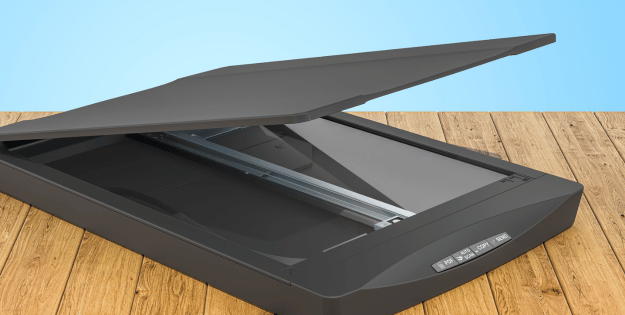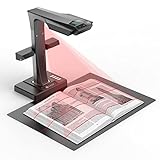In today’s digital age, preserving books in a convenient format is more important than ever. Whether for personal archives or professional use, the right book scanner can transform printed pages into easily accessible digital files. With a plethora of options available, choosing the best scanner can feel overwhelming. Document scanners, for instance, differ from book scanners in terms of efficiency and quality when handling various media, such as documents and photos.
From compact models perfect for home use to high-end devices designed for libraries, the variety of book scanners caters to different needs and budgets. Understanding the features that matter most—like scanning speed, image quality, and ease of use—can help anyone make an informed decision. This guide will explore the top book scanners on the market, ensuring readers find the perfect match for their scanning needs.
- Importance of Digitisation: Book scanners are essential for preserving physical books in a digital format, enhancing accessibility and facilitating better research.
- Types of Book Scanners: Options range from portable models for personal use to advanced overhead and automatic scanners for professional environments, catering to diverse needs.
- Key Features: Important factors to consider when choosing a book scanner include scanning speed, image quality, OCR technology for text conversion, and portability for convenience.
- Choosing Wisely: Assess individual needs, budget, and available space to select the most suitable book scanner, ensuring maximum efficiency and satisfaction.
Overview of Book Scanners
Book scanners play a crucial role in digitising physical books, preserving content for easy access and sharing. Selecting the best book scanners involves understanding their benefits and various types tailored to different needs. Overhead scanners, for instance, feature a scanning mechanism designed to operate above the scanning surface, which is particularly beneficial for handling larger or more fragile books, ensuring high-quality image capture and ease of use.
What is a Book Scanner?
A book scanner is a specialised device designed to convert physical books into digital formats such as PDFs, JPEGs, and TIFFs. These electronic machines capture text and images from printed pages, transforming them into digital files that can be easily stored and accessed on a computer. Book scanners come in various types, including overhead scanners, handheld scanners, and automatic scanners, each offering unique features and specifications to cater to different scanning needs. Whether you’re looking to preserve an entire collection of rare books or simply want to digitise a few documents, a book scanner can make the process efficient and straightforward.
Importance of Book Scanners
Book scanners facilitate the creation of digital copies, ensuring preservation of valuable texts. They streamline the process of archiving, enabling users to access information more efficiently and enhance research capabilities. For those operating a scanning business, investing in efficient book scanning technology is essential for handling a large volume of books efficiently.
Different Types of Book Scanners
Different types of book scanners cater to unique needs, including portable models for personal use and advanced systems for institutional applications. Each type offers various features, such as scanning speed and image resolution, to meet specific requirements.
Key Features to Consider
Choosing the best book scanners involves evaluating several key features that ensure optimal performance based on individual needs. High quality scans are particularly important for libraries and digitisation projects, as they ensure detailed and accurate image capture suitable for professional use.
Scanning Speed
Scanning speed significantly impacts efficiency, especially for users digitising multiple books. Faster scanning speeds reduce the time spent on projects, making it easier to manage large volumes of material.
High Quality Scans
Image quality is paramount for preserving text and detail. High-resolution output ensures that scanned pages maintain sharpness and clarity, facilitating better readability and usability when archived digitally. The importance of scan settings cannot be overstated, as they allow users to customise their scanning experience and ensure optimal image quality.
OCR Technology
OCR technology enables the conversion of scanned images into editable text formats. Effective OCR software recognises characters accurately and enhances searchability, providing more functionality for digital documents.
Portability and Size
Portability and size play a crucial role for users prioritising convenience. Lightweight and compact scanners are easier to transport, making them suitable for home, office, or on-the-go digitising tasks. The scanner size, including dimensions and weight, is essential for potential buyers considering portability and storage options.
Top Picks for Best Book Scanners
Various types of book scanners cater to different digitisation needs. Selecting the right type enhances the efficiency and quality of the scanning process. There are various methods and technologies to scan books, including smartphone apps and specialised book scanners, which offer convenience and advanced features like OCR technology for converting scanned content into editable formats.
Flatbed Book Scanners
Flatbed book scanners offer excellent image quality and are ideal for fragile books. They allow for high-resolution scanning with minimal book distortion, ensuring that details remain intact.
Overhead Book Scanners
Overhead book scanners efficiently digitise large volumes of books. They capture images from above, eliminating the need to flatten pages, which preserves the book’s spine and structure.
Handheld Book Scanners
Handheld book scanners provide portability and flexibility. Users can easily scan pages on-the-go, making them suitable for quick digitisation of various book formats. The battery life of handheld book scanners is crucial as it directly impacts their usability when on the go, with some models like the IRIScan Book 5 offering a limited number of scans before needing a recharge.
Automatic Book Scanners
Automatic book scanners enhance productivity by scanning multiple pages in rapid succession. They are ideal for high-demand environments where speed and efficiency are crucial.
Choosing the Right Book Scanner
Selecting the right book scanner involves understanding individual requirements and how they align with available options. Certain considerations can guide this decision to ensure maximum efficiency and satisfaction.
Assessing Your Needs
Determining specific needs enhances the selection process. Priorities like scanning frequency, types of books, and output quality affect the choice of book scanners. Identifying these factors helps narrow down suitable models.
For Personal Use vs. For Business Use
Book scanners are versatile tools that can be used for both personal and business purposes. For personal use, book scanners are perfect for individuals who want to digitise their book collection, scan documents, or capture images for personal projects. They offer a convenient way to preserve cherished books and make them easily accessible in digital form. On the other hand, for business use, book scanners are indispensable in environments that require the scanning of large volumes of documents, such as libraries, offices, and scanning businesses. These scanners can handle multiple documents quickly and efficiently, making them ideal for high-demand settings where speed and productivity are crucial.
Budget Considerations
Establishing a budget influences the options available for book scanners. Assessing the balance between features and cost ensures endpoints meet expectations. Competitive pricing can lead to finding functional scanners without overspending.
Space and Setup Requirements
Understanding space and setup needs is vital for efficient usage. Book scanners vary in size and configuration, impacting the area required for optimal operation. Evaluating available workspace facilitates a smoother integration into existing environments.
Choosing the right book scanner is essential for anyone looking to digitise their collection effectively. By understanding personal needs and budget constraints, individuals can find a scanner that not only meets their requirements but also enhances the preservation of their books. Whether opting for a flatbed scanner for fragile texts or a handheld model for convenience, the right choice can make a significant difference in efficiency and output quality. With the right scanner in hand, users can enjoy the benefits of easy access to their digital library while ensuring their physical books are preserved for future generations.
Legality of Book Scanning
The legality of book scanning largely depends on the purpose and scope of the scanning activity. Generally, scanning books for personal use is permissible, allowing individuals to create digital copies for their own reference and convenience. However, scanning books for commercial purposes, such as distributing or selling the digital copies, typically requires permission from the copyright holder. It’s essential to be aware of and comply with copyright laws and regulations in your country before embarking on any book scanning project, especially if you intend to share or distribute the digital copies. Understanding these legal boundaries ensures that your book scanning activities remain within the law.
Why should I digitise books?
Digitising books preserves important texts, making them more accessible and preventing degradation of physical copies. It enables easier sharing and enhances searchability, allowing users to quickly find specific content within multiple titles.
What features should I look for in a book scanner?
Key features to consider include scanning speed for efficiency, image quality for clarity, OCR technology for text conversion, and portability for ease of use. Assessing these features helps match a scanner to your specific needs.
Yes, flatbed scanners are ideal for fragile books as they provide excellent image quality without imposing pressure on the spine. They allow for careful scanning while ensuring the preservation of delicate pages.
How do handheld book scanners compare to other types?
Handheld book scanners offer great portability and flexibility, making them ideal for on-the-go scanning. However, they may not match the image quality or speed of flatbed or overhead scanners, which are better suited for larger projects.
What is OCR technology, and why is it important?
OCR stands for Optical Character Recognition, a technology that converts scanned images into editable text. It is essential for making digitised books searchable and useful for editing or repurposing content.
At lookinto.co.uk, Look Into dives deep into reviews, providing detailed comparisons and highlighting the best deals, so you don’t have to scour the internet. Whether you’re upgrading your home entertainment system, exploring new smart home solutions, or seeking advice on the latest tech releases, Look Into has you covered.












